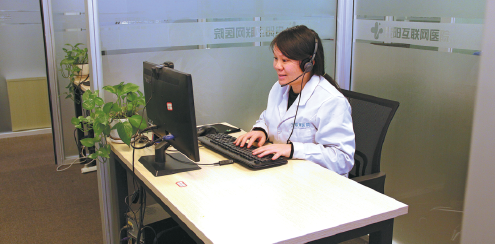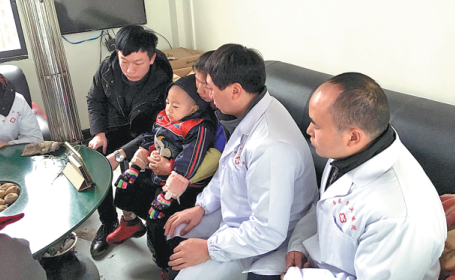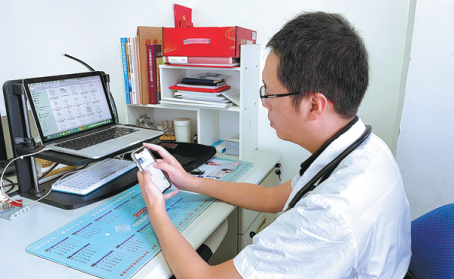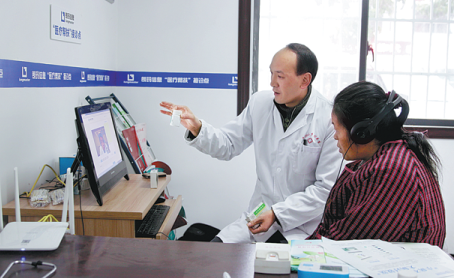Online hospitals change medical landscape

Across China, patients gain better access through technology, with more to come
Emergency surgeon Gao Wei sees patients during the day and then switches his identity to become an online celebrity who provides basic knowledge of medical health and first aid to massive audience.
Gao, of Miyun Hospital of Peking University First Hospital, has more than 20 million followers on the short video platform Douyin and he's still a bit surprised about being an online celebrity.
With the coronavirus pandemic, health has become a hot topic on social media. Large numbers of people are trying online diagnosis and treatment as more doctors become popular on the internet with many fans and followers, and the digital transformation of the medical industry has become the focus of attention.
"A short video brought 2.8 million new followers to me within five minutes," said Gao, who began to share scientific articles online in 2017. He has focused on shooting medical science videos since December.
Gao's articles and videos have been viewed more than 5 billion times. He has broadcast 50 livestream shows on various platforms, including one livestream that attracted audiences of nearly 70 million.
In the hospital, people recognize him now and then, and he feels that patients trust him more.
"I find satisfaction in popularizing science," he said. "It's a link between doctors and patients that brings warmth, understanding and trust."
Gao tried once to turn on the analytics function on Douyin and was shocked: In less than two hours, he had received more than 100,000 questions to answer.
"I couldn't answer them at all, and to be frank I didn't understand some of the questions, so I decided not to do it again but just continue to spread general knowledge," Gao said.
Online inquiry
Many doctors, some invited by the internet platforms, are providing medical services through leading online medical service providers such as Haodaifu and Dingxiangyuan.
The home page of haodf.com shows that 728,331 doctors at 10,661 qualified hospitals around the country were available as of Sept 18.
"It is a convenient platform for people to get professional advice from doctors. Besides, it provides more opportunity for patients to reach top experts," said Qi Ming, chief physician of the vascular surgery section of First Affiliated Hospital of Dalian Medical University in Liaoning province.
In his spare time, Qi also answers questions online. His homepage on haodf.com shows responses to 546 patients as of mid-September.
"It is more difficult to make diagnoses based solely on the description of the patients without a physical examination. But we can still give them directional guidance based on our experience," Qi said.
A patient surnamed Wang who was suffering from phlebitis in his right leg left a typical message: "Thank you very much for patiently answering my questions. I've followed your advice and took the medication actively. I'm feeling much better now. Thank you."
While the country was fighting the pandemic, more consumers have turned to the internet for the diagnosis and treatment of diseases, as well as for general healthcare information. Some minor diseases can be solved through an online consultation.
Dingxiangyuan's website, dxy.cn and dxy.com, an online community for medical consultations and diagnoses, received more than 110 million visits and 1.2 million inquiries within 100 days of the outbreak.
According to Li Tiantian, founder and chairman of Dingxiangyuan, at the beginning people were concerned mostly about how to protect themselves from COVID-19 and how to wear masks properly. Later, they focused on common and chronic diseases.
Because of the impact of the pandemic, many offline clinics and medical institutions were closed during the early period, and a large number of patients began to accept online consultations, Li said.
"Even so, growth of the internet-based medical care sector will not accelerate immediately since some online medical services rely on specialists, offline institutions and inspection equipment," he said.
But people are paying more attention to healthy lifestyles than ever before, and the market for healthy consumption will be stimulated, which will have a profound impact, Li added.
He said that while there are still many policy restrictions on the development of internet-based medical treatment, in the long run policies will be steadily loosened.
While fighting the pandemic, the government regularly introduced new policies to encourage development.
Policy support
To make it easier for people to purchase medicines and reduce the risk of crowd clustering and cross-infection, the National Healthcare Security Administration and the National Health Commission issued guidelines in February to promote internet-plus medical insurance services, including encouraging designated medical institutions to provide "no meeting" drug purchase services.
"Data show that digital healthcare has alleviated pressure on physical hospitals and prevented cross-infections," said Mao Qun'an, head of the National Health Commission's planning department, at a news conference on Sept 9 in Beijing.
Digital tools, such as big data and artificial intelligence, have enabled medical institutions to provide a range of services to the public online, including psychological consultation, distance diagnosis and management of chronic diseases, he said.
More than 40,000 medical workers traveled to Hubei province to support its fight against the virus; even more supported it online. In Jingzhou, medical aid professionals from Guangdong province helped build an internet-based virtual hospital at which more than 1,300 doctors from 15 medical institutions in Guangzhou volunteered to help.
Mao said the commission will join efforts with other government departments to ramp up infrastructure designed for novel technologies and push for consolidation of information systems set up by local institutions.
In May, the National Health Commission issued a circular requiring hospitals to introduce online diagnosis and treatment services for repeat patients who have common and chronic diseases and to cooperate with third parties to provide drug delivery services.
The online services will help ease the pressure on brick-and-mortar medical institutions, such as hospitals, and contribute to pandemic prevention and control, it said. It also stressed the importance of oversight over online medical services and called for the development of provincial-level platforms to monitor such services, as well as improved systems and measures to protect the privacy of patients seeking medical services online.
Internet hospitals
Online healthcare website vcbeat.top reports that there were 100 internet hospitals in China at the end of 2018. The number reached nearly 600 by July this year.
Unlike remote medical services and online medical consultation, which have been growing in popularity for years, internet hospitals must be based on a physical hospital.
Internet-based First Affiliated Hospital of Dalian Medical University was officially launched on Sept 17.With a smartphone, patients can initiate the whole regime of medical treatment at any time and anywhere through text and video consultation, online payment for prescriptions and ordering medicines to be delivered to the home by mail.
Li Shuxia, head of the hospital's outpatient department, said the scope of online diagnosis and treatment currently includes only follow-up and re-diagnosis in cases of chronic diseases and some common ones.
Patients who have a medical record at the hospital within six months can initiate a follow-up communication with the doctors via the internet.
"They still need to get checked out at the hospital if their conditions change," Li said.
Internet-based hospitals are not allowed to treat first-visit outpatients.
One hundred and thirty doctors from six departments are available online in specialties such as cardiology and cardiovascular surgery, nephrology, neurology and endocrinology.
Li said the hospital will increase the number of online departments and doctors available, as well as improve online functionality.
According to the price schedule set by the Liaoning provincial healthcare security administration, patients need to pay only 9.6 yuan ($1.42) to register for a visit.
"My patients need to pay 19.2 yuan at the offline hospital each time. But the lower price is not the point," said Zhang Ying, a doctor in the cardiology department. "Each week, only 20 patients can register to see me. With the online system, they can reach me more easily."
Zhang was invited by some leading online medical service providers to work on their platforms, but he is hesitant.
"We know nothing about the patients. If we just rely on their descriptions, there might be some error. I'd rather avoid the possible disputes," he said.
Technical assistance
Niu Tie, director of the hospital's information center, said Dalian Medical University's First Affiliated Hospital is the first internet hospital designed to use blockchain technology to secure patient data.
"With key data, such as patient information, being encrypted and stored in a reliable cloud, it is safe. The information are unmodifiable but traceable," Niu said.
In recent years, China has made great progress on internet technology and has brought new convenience to people's lives, said Li Tiantian, the founder and chairman of Dingxiangyuan.
Internet-based technologies, such as artificial intelligence, big data and cloud computing have boosted the development of China's digital healthcare, he said.
In Anhui province, the First Affiliated Hospital of the University of Science and Technology of China and other medical institutions related to it joined hands with Tencent to promote the "e-health card plus block chain" solution, which enables hospitals to safely and efficiently share their medical and health information of patients. It also provides more convenient conditions for residents to get medical treatment and manage their health.
"Safety has always been the focus. With blockchain technology, electronic health card help hospitals to efficiently connect people, data, diagnosis and treatment services, thus providing fast and safe information sharing channels for medical institutions," said Xu Bing, head of the hospital's information center.
In Guangdong province, Shenzhen Baoan People's Hospital Group has built a telemedicine consultation center with Mindray, a Shenzhen-based global provider of medical devices and solutions.
Sources from Mindray said that through a 5G network and Mindray's UltraSync technology, which can live-broadcast with synchronized devices-cameras with immediate acquisition and sharing of ultrasound images-they have improved the capacity of diagnostic and treatment services at the grassroots level and in remote areas.
In Guizhou province, a government-led telemedicine system has been set up. In the first five months this year it reached 330,000 deliveries of remote medical services, and the number of remote consultations exceeded 6,000, according to CGTN.
About 14 million rural residents in Guizhou province live in remote areas. The telemedicine platform provides people with convenient, high-quality, low-cost, sustainable medical services. It was built by Senyint, a remote diagnosis solution provider, and now connects 199 county-level hospitals and 1,543 town-level healthcare centers around the province.
Through the system, provincial and municipal-level hospitals can deliver remote training and consultations while also helping grassroots medical institutions achieve greater efficiency with remote checkups and diagnosis.
Fan Feifei in Beijing, Zhu Lixin in Hefei and Zhao Yandi in Guiyang contributed to this story.
zhangxiaomin@chinadaily.com.cn



























